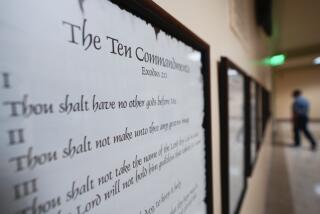ACLU Lawsuit Targets the Patriot Act
DETROIT — The American Civil Liberties Union filed a lawsuit in federal court Wednesday against parts of the USA Patriot Act that let authorities monitor the books people read and conduct secret searches.
“Ordinary Americans should not have to worry that the FBI is rifling through their medical records, seizing their personal papers, or forcing charities and advocacy groups to divulge membership lists,” said ACLU attorney Ann Beeson.
In March, the U.S. Supreme Court declined without comment to consider an earlier ACLU challenge to the government’s expanded surveillance powers under the act, which Congress passed after the Sept. 11, 2001, terrorist attacks.
The group asked the justices to consider when the government should be allowed to monitor telephone conversations and e-mail, then use the information to prosecute the monitored person.
Wednesday’s challenge was jointly announced by the ACLU in Michigan and Portland, Ore.
Justice Department spokeswoman Barbara Comstock said the section targeted by the lawsuit is narrow in scope, goes to great lengths to protect 1st Amendment rights and requires court approval to obtain records.
“The Patriot Act was a long overdue measure to close gaping holes in the government’s ability, responsibly and lawfully, to collect vital intelligence information on criminal terrorists to protect our citizens from savage attacks,” Comstock said.
An FBI spokeswoman referred calls to the U.S. attorney’s office in Detroit, which had no immediate comment.
Some of the groups participating in the lawsuit are the Washington, D.C.-based Council on American-Islamic Relations, the Muslim Community Assn. of Ann Arbor, Bridge Refugee and Sponsorship Services in Knoxville, Tenn., and the Islamic Center of Portland.
The Portland Joint Terrorism Task Force arrested the center’s imam, Mohamed Abdirahman Kariye, on Sept. 8, 2002.
He was subsequently sentenced to five years’ probation for Social Security fraud.
More to Read
Sign up for Essential California
The most important California stories and recommendations in your inbox every morning.
You may occasionally receive promotional content from the Los Angeles Times.










